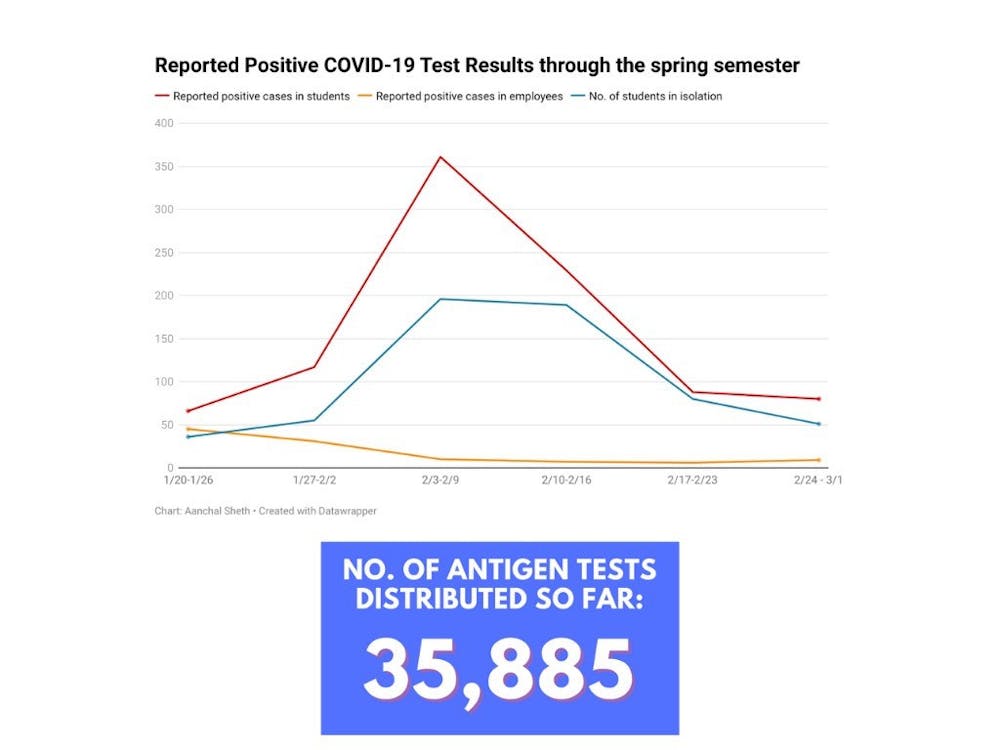Positive COVID-19 cases among students have declined for the third week in a row, according to a March 4 COVID-19 Campus Safety Update from Executive Vice President for Planning and Policy Russell Carey ’91 MA’06.
Eighty students reported positive COVID-19 test results from Feb. 24 to March 2, according to the announcement, a 10% decrease from the 88 positive tests reported the week before. Fifty-one students are currently in isolation in designated isolation housing on and off campus.
Nine employees reported positive COVID-19 tests in the same time frame, up from six the week before.
The University had “expected” a similar trajectory of COVID-19 cases to what the community has experienced this semester — a rise in cases at the beginning of the semester and a decline as the semester progressed, Carey told The Herald. Since the peak of 361 positive COVID-19 tests from Feb. 3 to 9, the University has seen a consistent decline in cases every week.
A similar decline “has been happening at other institutions and … in the community around us,” Carey said. “It's all headed in a good direction.”
The University will continue to provide two rapid antigen tests per week to the community through the end of March, Carey said. Testing remains optional for staff, faculty and graduate and medical students and the University has seen a decline in demand for tests from these groups, he added, emphasizing that University has enough test supplies to “get us through all of March.”
As of March 2, individuals who have received the recommended COVID-19 and booster vaccines are no longer required to wear masks at theater performances and in recreation and fitness facilities, The Herald previously reported. The updated guidance released March 2 also lifted mask requirements for fully-vaccinated lecturers at events sponsored by academic or administrative departments and student organizations.
“While we are encouraged that the numbers are declining … the cases we are seeing each week remain greater than at any other point in the pandemic,” Carey wrote in the March 4 announcement. “Accordingly, we are not yet ready to lift mask-wearing requirements in classes, laboratories, offices or other indoor settings.”
Julia Villani ’24, a member of Brown Emergency Medical Services, said some EMS operations, including delivering meals to students isolating in the Courtyard by Marriott Providence Downtown, were busier during the surge of COVID-19 cases earlier in the semester.
Before the semester, the service had been “prepping for a surge,” and had systems in place to be able to deal with a spike in cases, she added.
Villani also said that she appreciated having flexible rapid testing available during the week. “It's important for people who are going to office hours with an immunocompromised or older professor to be respectful and take the tests,” she said.
Students who spoke to The Herald agreed that despite the spike in COVID-19 cases in early February, student life in dining halls, residence halls and on campus in general has remained normal.
Jonah Bernstein-Schalet ’24 said he thought most people have not “changed the way they were doing things,” adding that fewer cases in the community is still beneficial because there is less of a risk of having to isolate. In February, every couple of days he said he would hear of another person he knew testing positive for COVID-19 and having to isolate, including many of his friends.
Some classes have also begun in-person instruction after beginning the semester remotely due to rising case counts on campus.
One of Bernstein-Schalet’s classes — COST0535: “Self Transformation and Transcendence in Later Daoist Contemplative Traditions” — recently transitioned to in-person instruction for lectures, while the lab portion of the course remains online.
“It’s definitely better to have classes in person,” Bernstein-Schalet said. “It’s more effective — you put more effort into it because actually going and being there with other people is different than just opening your computer.”
Villani’s NEUR1020: “Principles of Neurobiology” also recently transitioned to in-person instruction. She said it is easier to stay engaged during in-person classes, and that it is nice to get back the “little things sacrificed during online classes,” such as casual interactions with other students.
“I wouldn't say it was a huge difference in the grand scheme of things just because it was my only class that was transitioning from online to in-person,” Villani said, “but it was still a welcome transition nonetheless.”
Haley Sandlow is a contributing editor covering science and research. She is a junior from Chicago, Illinois studying English and French.





